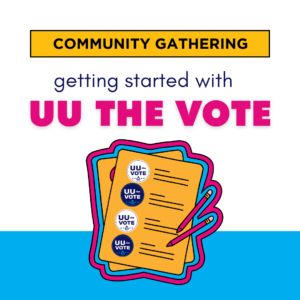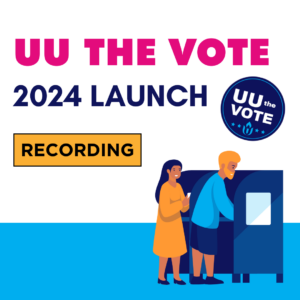In Philadelphia, long-term relationship building is facilitating UU’s connection to meaningful change, both for the elections and in this moment of protest. Reverend Abbey Tennis, Lead Minister at First Unitarian Church of Philadelphia, speaks to how broadening connections beyond church walls can amplify efforts towards justice.
On May 16th, around seventy Unitarian Universalists opened their laptops. It was two days before the deadline to register for the primary in Pennsylvania. People came to the virtual event from New York City, from D.C., and of course — from Philadelphia. A worship service started the day, followed by a training on phone banking. Then the UU’s from across state borders called potential voters, applying action to the values of democracy and justice. They made 1,710 calls, reached about 200 people, and heard commitments to vote from around ⅔ of the people they reached — numbers that may seem low at first glance, but are impressive for regulars to phone banking. How was such a holistic, coordinated event created?
In January members of the First Unitarian Church of Philadelphia were in conversation, imagining what it would look like to see UU’s working for voter registration in partnership with community members. On Martin Luther King, Jr. day, they decided to launch their effort. “We included an insert in the order of service that said, ‘Yes! I will register 10 or more voters by November,’” Rev. Tennis said. “We got over 60 people committing to register voters that day. It ignited people’s excitement about creating something real.” Rev. Tennis and lay leaders began to organize in order to provide opportunities for members to make real on that commitment.
The phone banking success would not have been possible without the help of a regional interfaith Philadelphia organization called POWER. The organization provided the program that so many UU’s used on that day — and they have been providing people of faith the tools to fight for justice and a more equitable society for years.
POWER is a nonpartisan organization representing over 50 congregations in Southeastern and Central Pennsylvania. They are a member of the national umbrella Faith In Action and the national Live Free campaign. As Live Free states, there are over 118 million people attending weekly services in over 350,000 congregations across the U.S. Tapping the potential of faith-based people for social justice has the capability to influence the political and social landscape massively and address the root of injustice.
Organizations like POWER can bring the tools, the resources, and the expertise. Congregations can bring the people power.
While the daily movement towards justice can seem to progress at a painfully slow rate, it is the long standing connections between faiths that build trust. So when the Movement for Black Lives this past month gained rapid traction and enabled actions to accelerate at a break-neck speed, the connections that were already in place through this long term work made meaningful engagement possible. “Because we have already been working together within POWER for racial, educational, and economic justice for years, it’s possible for my congregation to be making effective change now,” Rev. Tennis said.
A group of 50 clergy members recently flanked protesters in Philadelphia. As the police force indiscriminately tear gassed city residents during demonstrations — a method condemned as illegal in warfare — the group created a text thread. Now they show up to the protests, live streaming and providing a number of people in clerical garb in the hope that their presence may de-escalate police violence.
The work that led up to the protests is paired with a push for deeper, lasting change. “What I’m hearing from my interfaith colleagues of color is that we need to be working for change at the city level, change at the police budget, change for police accountability. And that each of us needs to also be doing voter rights actions, voter engagement actions, because those are the long term tools that actually create the kind of change called for in the protests,” Rev. Tennis said.
Recently, POWER and other organizations in the city scored a small success. 14 of 17 members in the City Council signed a letter to the mayor calling for defunding and police accountability. POWER had presented a demand for these changes in December. The letter included language from POWER’s demand “almost word for word, in some cases,” according to Rev. Tennis. When change was at the City Council’s doorstep, they looked to the steady movement of community groups and implemented the change they had been seeking on a day-to-day basis.
Rev. Tennis knows that many cities do not have multiple UU congregations collaborating with interfaith justice coalitions. She wants to encourage them to reach out in interfaith spaces, or to other UU congregations in the region. “Just meeting with two other clergy in a town and starting a relationship… moments like this can lead to that long-term work in the future,” Rev. Tennis said. These connections aren’t only important in states that get national attention during presidential election years. “A lot of the work matters to our cities, our states, and our regions, no matter where we live. It is really possible for all congregations to join their strength and create change.”
“Just meeting with two other clergy in a town and starting a relationship… moments like this can lead to that long-term work in the future,” Rev. Tennis said.
Written by Aidan Wertz, UU the Vote blogger. Aidan is a college student in Middlebury, Vermont and a lifelong UU.




